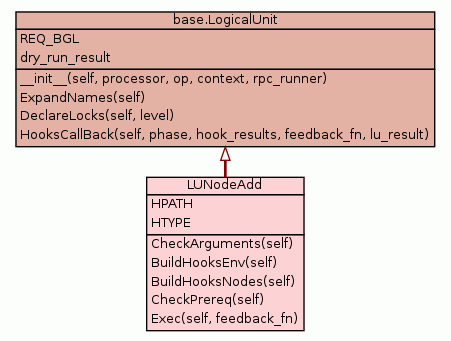
| Trees | Indices | Help |
|
|---|
|
|

Logical unit for adding node to the cluster.
|
|||
|
|||
| dict |
|
||
| tuple; (list, list) or (list, list, list) |
|
||
|
|||
|
|||
|
Inherited from Inherited from Inherited from |
|||
|
|||
HPATH = "node-add"
|
|||
HTYPE = "NODE"
|
|||
_NFLAGS = ["master_capable", "vm_capable"]
|
|||
|
Inherited from |
|||
|
|||
|
Inherited from |
|||
|
|||
|
Inherited from |
|||
|
|||
Check syntactic validity for the opcode arguments. This method is for doing a simple syntactic check and ensure validity of opcode parameters, without any cluster-related checks. While the same can be accomplished in ExpandNames and/or CheckPrereq, doing these separate is better because:
The function is allowed to change the self.op attribute so that later methods can no longer worry about missing parameters.
|
Build hooks env. This will run on all nodes before, and on all nodes + the new node after.
|
Build hooks nodes.
|
Check prerequisites. This checks:
Any errors are signaled by raising errors.OpPrereqError.
|
Adds the new node to the cluster.
|
| Trees | Indices | Help |
|
|---|
| Generated by Epydoc 3.0.1 on Wed Dec 30 13:42:38 2015 | http://epydoc.sourceforge.net |